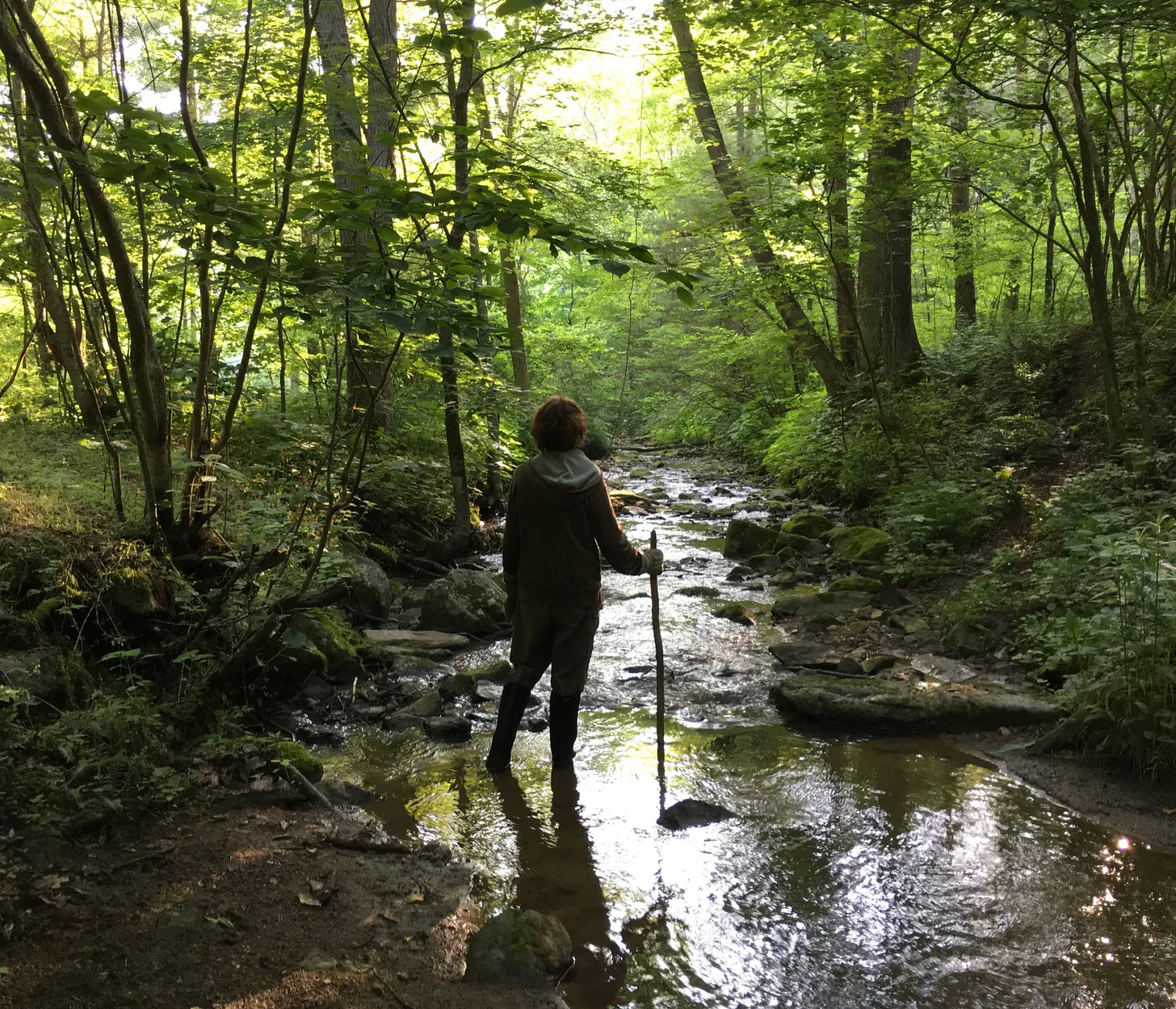If all who wander are not lost, neither lazy are all who sit, still and quiet, in the woods.
Simple stillness can be a filter that protects us from hurry. It can become a lens through which to see the world in a way more clear and rich than bodies and minds in motion can know.
I often seek out my sit spot, just a short walk up the valley from the house–a therapeutic eddy in the currents of busy-ness and worry.
It is not easy to stop and be patient, but this is your task.
And you won’t, every time you come, be rewarded by deep stillness. And when it comes, it will necessarily come slowly, with patience. But when things go well and you clear the cobwebs and mute the list-maker, suppress the oughts and shoulds, tame the demons of duty, and suppress the one-who-acts you are will emerge simply as the be-er, with your Self apart from any action, duty or need.
Time becomes an inner sense; palpable–a flow you can almost touch, behind and ahead of your present moment–as if leaning against your tree you might spread your arms wide and touch your fingertips to the river of past and future ever so slightly while moving not at all.
Take your self, by stillness, out of the current, stepping off the moving walkway of time’s river. In this sanctuary of motionless place will appear a small but useful window–out onto the cosmos centered for a while on a be-ing within it that you can only know when you are still.
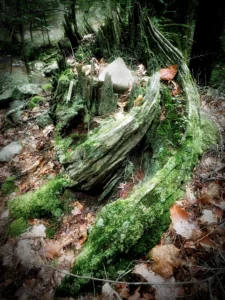
During the first minutes of slowing down while leaning back against your favorite tree, the demon of obligation will tug persistently at your sleeve.
Remember what you left undone, he says accusingly. Have you forgotten what you were in the middle of just ten minutes ago!
You look at your watch to confirm that time has indeed passed with not a single task completed since walking out the door. You’re wasting time. Idle hands are the devil’s workshop. But you shake those little demons from your shoulders and put your watch in your pocket.
And you return to your breathing. Each breath from here on carries you down, down, pleasantly heavy in place, in peace, free of hurry or worry.
This is not everyday language, but such altered states that can and often do come from hours or days in the wilderness have empowered poets, painters, statesmen and saints.
Your pulse and the rhythm and shape of your breathing have changed now.
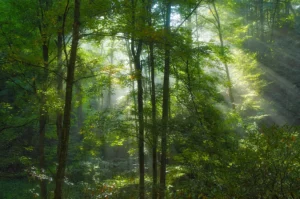 You feel a pleasant heaviness that easily overcomes the earlier urge to rush away. You imagine root hairs emerging slowly off the under surface of your calves, piercing the humus, tapping you into the thrum and essence of Earth itself–rooted to that special spot.
You feel a pleasant heaviness that easily overcomes the earlier urge to rush away. You imagine root hairs emerging slowly off the under surface of your calves, piercing the humus, tapping you into the thrum and essence of Earth itself–rooted to that special spot.
You have been patient. Those few square meters of generic forest that you have moved quickly through so many times before now is yours. You belong to this place at this still point. Even the rest of nature accepts you in your place.
And you are an accretion, an outgrowth of the tree against which you lean. The red-tinged gray fox squirrels on a nearby hickory resume their business gathering nuts; the nuthatches go back to exploring bark crevasses for beetles, and a doe resumes her grazing on the lush annuals along the creek’s edge.
The forest’s rhythms become yours as long as you stay in this stillness.
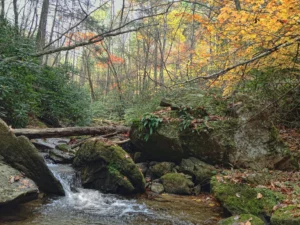 Two chipmunks return to their interrupted courtship; I am a voyeur. A third squirrel stops his descent suddenly two feet above your head–and you can barely make him out if you arch your neck back impossibly far. He thinks better of reaching the ground down your trunk and not the tree’s. He scoots a few nervous footholds to the far side of the tree before coming around to forage for hickory nuts just beyond your boots, unafraid.
Two chipmunks return to their interrupted courtship; I am a voyeur. A third squirrel stops his descent suddenly two feet above your head–and you can barely make him out if you arch your neck back impossibly far. He thinks better of reaching the ground down your trunk and not the tree’s. He scoots a few nervous footholds to the far side of the tree before coming around to forage for hickory nuts just beyond your boots, unafraid.
Everywhere about you now are the sounds of chewing and buzzing and scurrying and flying. With your head back against the poplar, feel more than hear the grinding of long-horned beetle mandibles on wood, just under the bark.
These are normal senses heightened by intention and attention–by act of will, with expectation; active not passive as we usually and barely know the senses.
Notice smells that you were not aware of before–wet, earthy smells; green vegetable smells; the scent of almonds (a few cyanide millipedes invisible somewhere under the leaf litter) and teaberry and spicebush; and the “wax lips” smell of spleenwort wafting up from the rocky creek margins.
In a way not possible from a coffeeshop, board room, speeding car or 747, be aware of kindred co-existence with green and feathered and microscopic things as alive as you are alive, breathing the same air–the plants around you even breathing in the essentials for growth from in your exhalations.
They eat, they feel the same sun you feel on your face, they mate and move towards pleasure and away from pain. We are not so different from each other–mold and mouse and man. “As the one dies, so dies the other” says the teacher in Ecclesiastes.
And when the sun’s warmth disappears over the western ridge, settle back for a few more minutes here knowing that soon you will be obliged to shake off this pleasant directed idleness, get your body revved back up to fight-or-flight, and with regret and thankfulness for your personal ecology, step back full pace onto the hamster wheel of a busy but certainly tolerable life on Earth.
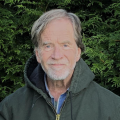 – Fred First is an author, naturalist, photographer watching Nature under siege since the first Earth Day. Cautiously hopeful. Writing to think it through. Thanks for joining me. Subscribe to My Substack HERE
– Fred First is an author, naturalist, photographer watching Nature under siege since the first Earth Day. Cautiously hopeful. Writing to think it through. Thanks for joining me. Subscribe to My Substack HERE

